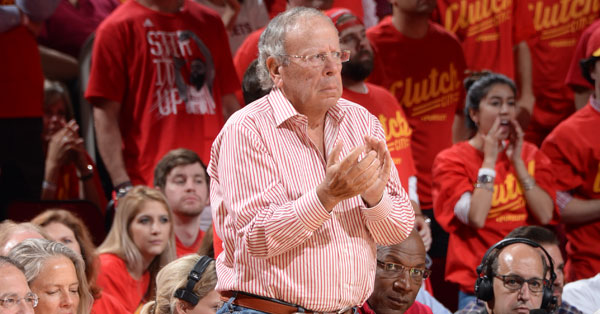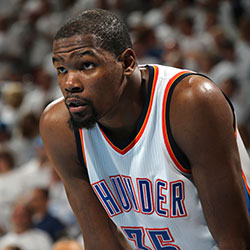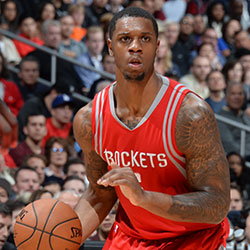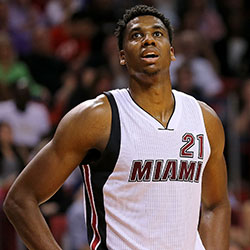Houston Rockets
Houston Rockets Salary Cap Update: 2016 Offseason Pre-Draft Edition
After a disappointing 2015-16 campaign, the Rockets are poised to have significant cap room this summer. David Weiner breaks down their cap situation as they move into the offseason.
Published
9 years agoon
One year ago at this time, the Houston Rockets were battling through the Western Conference on their way to a conference finals series against Golden State.
Man, how things can change in one year.
Last summer, the Rockets had grand designs of building a championship-contending roster much better than the team that had just lost to the Warriors, who were clearly better than Houston. They were going to get back a (presumably) healthy Donatas Motiejunas. They re-signed both Patrick Beverley (a key piece missing from their playoff run) and Corey Brewer (an integral part of that playoff run). The Rockets even had a potential sign-and-trade deal lined up to acquire free agent LaMarcus Aldridge from Portland, but Aldridge ultimately chose to sign with San Antonio.
Fast forward about a year, and the Rockets look like a team in turmoil. Head coach Kevin McHale was fired just eleven games into his three-year contract extension. His replacement, interim coach J.B. Bickerstaff, did not fare much better, “leading” the team to a mediocre 37-34 record. James Harden and Dwight Howard could not get along and never truly meshed on the court. Brewer and Terrence Jones had utterly disappointing seasons. Motiejunas’s back injury lingered longer than expected, hampering his development. Even a February trade deadline deal of Motiejunas for a first round pick was voided after Motiejunas “failed” his physical in Detroit. As for the Rockets’ own first round pick, … more on that below.
The 2015-16 Houston Rockets season may go down as among the most disappointing, aggravating and just plain awful seasons in Houston sports history. For us diehard Rockets fans, this season felt like a long series of gut-punches. While getting a lone playoff victory over Golden State was nice and all, many felt that Houston’s elimination from the playoffs (4-1) was like a mercy killing.
With the season now ended, it’s time to once again take a look at the team’s salary cap situation and where the Rockets can go from here.
Player Salary, Exceptions and Available Cap Room
The Houston Rockets currently have the following player salary commitments, cap holds and salary cap exceptions available for the 2016-17 season:
Player salary commitments: Howard ($23.28 million – player option), Harden ($16.78 million), Trevor Ariza ($7.81 million), Brewer ($7.61 million), Beverley ($6.0 million), K.J. McDaniels ($3.33 million), Sam Dekker ($1.72 million), Clint Capela ($1.30 million), Montrezl Harrell ($1.05 million), Michael Beasley ($1.40 million – non-guaranteed), and Andrew Goudelock ($1.02 million, non-guaranteed).
Cap holds: Jones ($6.22 million – Rockets hold full Bird rights), Motiejunas ($5.72 million – Rockets hold full Bird rights), Jason Terry ($980,431 – Rockets hold full Bird rights), and Josh Smith ($980,431 – Rockets have only Non-Bird rights).
Other Salary Cap Exceptions: If Houston operates over the salary cap this summer (an unlikely scenario but at least possible if Howard opts in to his contract), the Rockets will have access to the Mid-Level Exception (MLE), either the Non-Taxpayer variety ($5.628 million, the use of which would impose a hard cap at the “apron” level – currently projected at $112 million) or the Taxpayer variety ($3.477 million), as well as to the Bi-Annual Exception ($2.203 million). In the much more likely event that the Rockets use their available cap room this summer, they could instead have the Room Exception of $2.898 million at their disposal.
Given these salary commitments and exceptions, and based on the currently projected 2016-17 salary cap of $92.0 million, the most cap room the Rockets could create (barring trades … yeah, I know) is about $44.22 million. This assumes that Howard opts out of his contract and would involve renouncing rights to all free agents and waiving Beasley and Goudelock. If Howard opts in, that figure drops precipitously to $21.49 million. However, expect Howard to opt out and for the Rockets to hold onto Beasley and at least attempt to hold onto Motiejunas. So, adding their salaries/cap holds, that cap room figure comes out to about $38.19 million. Regardless, expect the Rockets to explore trades that could open up additional room.
So… What Happens Next?
As the Rockets prepare for the NBA Draft and the subsequent free agent season, there will be some internal maneuvering for GM Daryl Morey and his staff to do.
Most immediately, the Rockets need to hire a new head coach. With several prominent names still in contention (among them, Jeff Van Gundy, Frank Vogel and David Blatt), Houston is casting a wide net in their coaching search. This approach should benefit the franchise in gaining as much outside knowledge as it can while also establishing favorable long-term relationships around the basketball world. There is some thought that the Rockets might hold off signing a new head coach until after free agency begins, in order to allow a marquee free agent like Kevin Durant to join with Harden in hand-picking his own coach. But the likelier scenario is that the Rockets – perhaps with some input from Harden – hire “their guy” without putting that decision squarely in the hands of its prospective star players.
Houston will need to decide whether to extend qualifying offers to Motiejunas ($4.43 million, more than he’d otherwise receive based on his prior salary due to meeting the “starter criteria” of starting 82 games over the course of the past two seasons) and to Jones ($3.53 million) in order to make them both restricted free agents and to give the Rockets the ability to match any offers from other teams. More on those decisions below.
In preparation for the eventuality that their pursuit of big name free agents to fill all of their cap room doesn’t play out as hoped for, the Rockets may also once again explore the possibility of bringing over one or more of its “draft rights held” players from overseas, led by everyone’s favorite tease, 2009 second round pick Sergio Llull. Houston’s courtship of the now 28-year old Llull (a 6-3 combo guard who has developed into one of the top guards in Europe) fell apart last summer, and Llull ended up signing a long-term contract extension with Real Madrid. However, reports are that the extension actually lowered Llull’s NBA buyout, thus far one of the biggest impediments to his NBA debut. After years of flirtation, most Rockets fans won’t be holding their breath for a Llull signing. But in a summer where free agent deals will hit astounding levels, having exclusive NBA rights to a player of Llull’s caliber may be helpful, either to sign him outright or as a trade asset.
Another international prospect who might help next season is Alessandro Gentile, a 6-7 scoring wing taken with a 2014 second rounder purchased by Houston. But with Ariza, Brewer, McDaniels and Dekker all under contract for next season, it is hard to see a role for Gentile without one or more trades clearing the Rockets’ glut at small forward.
Draft Day Maneuvering
The Rockets will enter the 2016 NBA Draft armed with the 37th and 43rd picks, about $2.96 million in remaining cash to spend before July 1, as well as an assortment of young players, draft rights and future picks to trade. However, unlike in years past, the prospects for a significant draft night trade – something that the Rockets are known to actively seek – will be fairly low.
Because Houston remains subject to a hard cap through June 30, the Rockets cannot exceed the 2015-16 “apron” level as a result of any draft night trade. With the Rockets a mere $242,000 or so shy of the apron, unless a trade involves Houston dumping salary, most trades will be prohibited. Of course, a trade could be agreed to in principle, with the actual consummation of that trade not going through until following the July Moratorium.
Houston will be without its own first round pick (15th overall), which was sent to Denver in the Ty Lawson trade. The protections on that pick were unique in that the top-14 protected first rounder in 2016 immediately converted to a 2017 second round pick if the Rockets missed the playoffs, rather than the more common carryover of owing a future first round pick (a restriction that often has lingering negative effects on a team’s ability to trade future draft picks). So while the Rockets could have kept a pick in the 12-14 range had they missed the playoffs in the last week of the season (owing only Portland’s second rounder next season), they instead convey their pick and move on.
As for the draft slots Houston currently holds, the Rockets could go in a number of directions. They could elect to use both picks on players to add to their roster for next season, as second round picks count $0 against the cap until signed, and there is expected to be a lot of roster turnover this summer anyway. They could instead use one (or both) of those picks on an international draft prospect, as this year’s draft is expected to have one of the deepest international crops in recent memory. The Rockets could also look to move up in the draft – something they often try to do – although don’t expect a package of #37 and #43 to move them too far up the draft board (last year, Minnesota traded the 31st and 36th picks to move up to pick #24).
Also, don’t be surprised to see Rockets owner Leslie Alexander once again allow Morey to spend his remaining cash allotment this season on an additional second round pick to stash overseas (as the team has done in recent years with Furkan Aldemir and Gentile). With several teams holding multiple picks in this year’s draft (led by Boston, with an astounding eight picks), the odds of multiple second round picks switching hands on draft night is fairly high.
Internal Free Agent Decisions
The Rockets have several key decisions to make regarding their own free agents that could impact what they do in free agency.
Dwight Howard: The first domino that must fall for the Rockets to execute any big summer plans is Dwight’s decision of whether or not to opt out of his contract. His $23.28 million player option year is likely more than he will get on an annual basis as a free agent. But Howard will turn 31 years old in December and will likely want to lock in a longer-term deal before his skills decline much further. There is also the possibility that at least one team (among the many expected to be flush with cap room and have no one else to spend it on) will offer Howard a huge contract paying him as much as $25-30 million per season. However, don’t expect the Rockets to be one of those teams. While the door cannot be completely closed to the possibility of Howard’s return to Houston on a more reasonable multi-year deal, it is becoming increasingly more evident that if (or when) Dwight opts out of his contract, he will be moving on to another team.
Terrence Jones: Few players did more to hurt their free agent stock than Jones this past season. Once thought by many to be lining up for a huge contract (Zach Lowe wondered whether Jones could possibly get offers in the $15 million per year range!), Jones suffered through a disappointing season filled with poor defensive focus and more strange injuries. He ended the season as the fifth power forward on the depth chart. Although Jones will have a cap hold this summer of $6.22 million, the Rockets will need to extend him a one-year, $3.53 million qualifying offer in order to make him a restricted free agent. The extension of such a qualifying offer once looked like a no-brainer but is now seriously in question. It will be a surprise at this point if Jones is a Rocket next season.
Donatas Motiejunas: Motiejunas represents a very interesting case for the Rockets. At 7-0 with both post skills and three-point range (a combination held by only a handful of NBA players), D-Mo will undoubtedly have his share of suitors in free agency. But his back injury has turned out to be a more serious red flag than many anticipated. Detroit – once thought to be the Rockets’ biggest competitor for Motiejunas this summer – voided its trade for D-Mo after its doctors expressed reservations about the long-term prognosis for that back. Motiejunas came away from that experience with a resentment for Detroit, so there may not be a future for that relationship. Although D-Mo will have a cap hold this summer of $5.72 million, the Rockets will need to extend him a one-year, $4.43 million qualifying offer in order to make him a restricted free agent. Expect the Rockets to extend that qualifying offer and to hope they can execute other moves in free agency before having to worry about matching an offer sheet for him.
Jason Terry: Despite some purported interest in a coaching gig, Terry recently expressed a desire to play another year or two before retiring. As one of the few stable veteran voices for the Rockets last season, it is scary to consider how awful Houston’s locker room would have been without him. And while his production on the court wasn’t too far from that of the prior season (his shooting percentages dipped a little and his defense was once again atrocious), it may be time for the Rockets to part ways with the venerable Terry.
Josh Smith: After spurning the Rockets (and their larger contract offer) for a veteran’s minimum deal with the Clippers, it was all downhill for Smith. The Clippers ended up paying Houston to take Smith off their hands. A solid defender and gifted passer, Smith still showed enough to get a couple of chances in the Rockets’ lackluster power forward rotation. But with several power forwards under contract for next season, don’t expect to see Smith back.
Michael Beasley: Beasley was one of the few pleasant surprises for the Rockets this past season. After an MVP season in China, Beasley came in and immediately became Houston’s second-best offensive weapon. He fulfilled his role as a bench chucker, pouring in several long two-point shots that only Harden seemed permitted to take, as those two were likely the only two players on the roster capable of shooting a high enough percentage of them to make that shot worthwhile. Beasley has a non-guaranteed salary of $1.40 million for next year (which becomes guaranteed if he is not waived by August 1). Especially since Beasley could easily get an MLE-sized deal (or more) in free agency, expect Houston to hold on to him, either as an offensive weapon off the bench next season or as a trade chip this summer.
Andrew Goudelock: Goudelock was brought in to replace Ty Lawson and Marcus Thornton as a backcourt scorer off the bench. However, as a late-season addition, Bickerstaff never showed enough trust in Goudelock to play him over Terry. His situation became even more odd during the playoffs, when Bickerstaff elected to make Jones (a fifth power forward) active over Goudelock (a third point guard and just the fourth “true” guard on the Rockets’ roster) for Games 2, 3 and 4 against a Golden State team with plenty of backcourt depth. With Bickerstaff out, it is possible that Morey likes Goudelock enough to keep him around for next season on a $1.02 million non-guaranteed deal (which becomes guaranteed if he is not waived by August 1). But if the Rockets need the extra $472,000 or so in additional cap room that can be created by waiving Goudelock, they probably won’t lose too much sleep over waiving him. If no one claims him off waivers, the Rockets can still re-sign him to a vet minimum deal.
#Pursuit of Outside Free Agents
At the center of the Rockets’ plans to return to NBA prominence is the pursuit of one or (more likely) two star free agents.
The headliner of the 2016 crop of free agents is Durant. (With Lebron James most likely staying put in Cleveland, we’ll exclude him from this group for all intents and purposes.) Durant’s free agency has been talked about for years, with rumors of his possible interest in playing with Harden in Houston circulating as long ago as 2013. While it is a long shot that Durant will actually elect to sign with the Rockets, his talent is prodigious enough that pursuing him as Plan A is still worth it.
Another free agent who could be high on the Rockets’ wish list is Al Horford. Capable of playing power forward or center, Horford would be a suitable replacement for Howard. Horford’s combination of long-range shooting (he can hit long two-point shots at a clip high enough to get them in the Rockets’ offense) and all-around good defense make him an intriguing possibility.
As nine-year veterans, Durant and Horford will each be eligible for a max starting salary worth a little over $25 million (with an actual max figure to be determined during the July Moratorium). One complication to signing either to a long-term contract is that each becomes entitled to a much higher starting salary in 2017, when they become ten-year veterans assigned a larger percentage of the salary cap as their max salary. While Horford may take the long-term security of a deal this summer, many believe Durant will seek a two-year deal (with a player option on Year 2) similar to the deals Lebron has signed with Cleveland each of the last two summers in order to cash in next summer.
A slightly more “affordable” Howard replacement (as in a starting salary of closer to $20 million) could be Hassan Whiteside. A talented center who squandered the first several years of his professional career underachieving compared to his tremendous natural talent, there is some concern that Whiteside will revert to his old ways once he secures a lucrative long-term deal. But as a premier rim protector, Whiteside could be worth the gamble.
Paying Kevin Durant
Most expect Durant to re-sign with Oklahoma City this summer. With Russell Westbrook and Serge Ibaka, the Thunder provide Durant with a competitive enough roster to justify his staying put. But re-signing with Oklahoma City does not necessarily guarantee Durant the most long-term salary.
The jump in the salary cap (and, by extension, the max salary) this summer means that any team with enough cap room can offer Durant a starting salary equal to what the Thunder can offer. And with another huge jump in the cap expected next summer, a team like the Rockets could conceivably use newly available cap room to re-sign Durant next summer to a long-term deal as lucrative as anything Oklahoma City could give him.
Conclusion
After a miserable season, the Rockets must now turn their attention to repairing their roster – as well as their basketball culture – via the draft, trades and free agency. Morey and [whoever the next head coach is] will need to come up with a variety of alternative plans to return the Rockets to respectability, let alone title contention. It remains to be seen whether Plan A (where Durant comes to save the franchise), Plan [X] (another rebuild) or any plan in between ends up being the path they take.
You may like
Houston Rockets
Looking Back on the Trade for Phoenix’s Draft Picks
Are the Rockets set to cash in on Phoenix’s downfall or could a Suns retool murky the waters?
Published
2 months agoon
March 12, 2025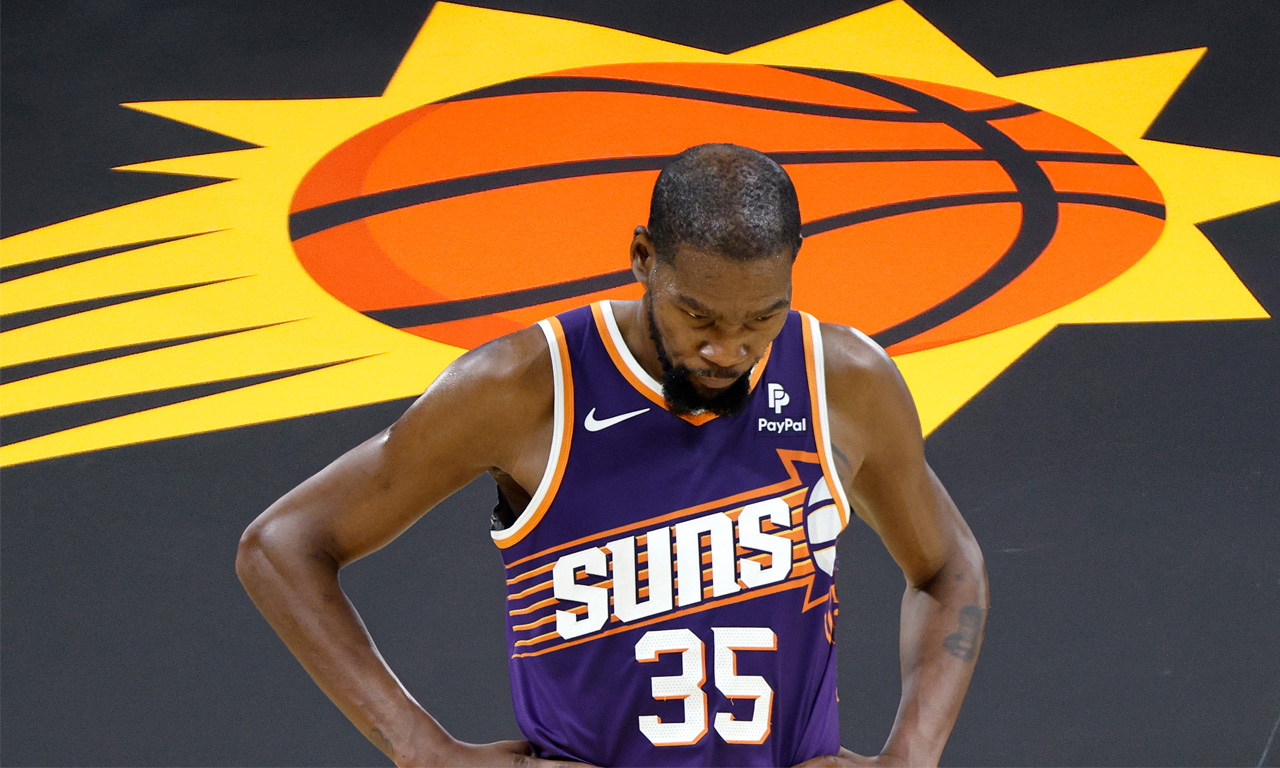
As the Houston Rockets set to host the Phoenix Suns tonight, it seems the right time to take a look back at the trade that linked these two franchises together for the foreseeable future.
This past June, the Rockets made a trade with Brooklyn that sent back to the Nets control of their 2025 and 2026 unprotected first-round picks. In exchange, the Rockets received a large chunk of Phoenix’s future (2025, 2027, 2029) and control of the Dallas Mavericks’ 2029 first.
In essence, the Rockets traded one pick and one swap for two picks and two swaps. All unprotected.
Thoughts At The Time of the Trade
If I’m going to discuss the current outlook of this trade, I have to be honest about how I saw it at the time of the move. While I didn’t hate this trade initially, I definitely didn’t love it either.
I liked that the Rockets increased their overall trade assets. I also liked that they extended the timeline to be able to make a bigger trade and I also appreciated that they kept control of the 2027 Brooklyn swap.
But I didn’t like that the Rockets gave up what seemed like the more established value (Brooklyn) for a more uncertain gamble (Phoenix). The Rockets did not control a “tanking runway” of picks to offer back to Phoenix — all of the picks Houston got in the deal were in staggered years (’25, ’27, ’29). I also felt Brooklyn, who badly needed to rebuild, got away with paying market value to get their picks back despite the fact that the Rockets invested years in watching those picks appreciate up to the point that they had the Nets completely over a barrel.
Net-net: I felt like more certainty was traded for less certainty and it was more of an equitable trade for both teams rather than Brooklyn paying dearly to get back the things only the Rockets could offer.
There were two ways I thought this trade could pay dividends: The Suns needed to flame out immediately, as in this season (unlikely), or the Rockets could trade all those pick assets as part of a deal for a real superstar in the next 12-18 months (more likely).
In a testament to how quickly change can occur in a very unpredictable NBA, four things have happened that have been positive indicators for the Rockets in making this move.
The Suns are fading
While Phoenix had major salary cap issues, dealing with the second apron, they didn’t appear to have problems on the court. They jumped out of the gate 8-1 and looked like a legitimate contender behind their star trio of scorers in Kevin Durant, Devin Booker and Bradley Beal.
Given Houston controlled Phoenix’s pick this year via a swap, it looked like the Rockets would come up empty-handed on the trade this season.
That changed quickly.
Injuries, serious depth concerns and a lack of a defensive identity has sent Phoenix spiraling. Booker’s availability has been inconsistent, forcing Durant to carry the load, while Beal has not quite fit in at all. Their financial limitations, thanks to owner Mat Ishbia’s all-in spending spree, have handcuffed their ability to improve the roster around the three stars.
The Suns are sitting 11th in the West, having gone 22-34 since that hot start, and are currently trying to catch a depleted Dallas squad to get back into the play-in picture.
As of right now, the Rockets project to end up with a lottery pick (albeit a late one) this season out of the trade.
Phoenix was caught shopping Durant
Because the Suns struggled so hard after the start, they tried to make a major move at the deadline but could not unload Beal, in large part due to his no-trade clause.
As a result, they may have made a misstep: They openly tried to trade Durant, which inevitably became public news.
Now? Durant will almost assuredly be traded this summer — likely to a destination that he handpicks. This means the Phoenix Suns will have to look at all possibilities for their future, including potentially having to give Rafael Stone and the Rockets front office a call.
But keep in mind, the Rockets can not offer Phoenix the ability to completely rebuild via the draft right now. Phoenix’s 2026 pick is controlled by Washington. They would have to get extremely creative to set that stage. A retool in Phoenix is much more likely.
Could Brooklyn have been better than expected?
This one is tougher to gauge.
The Brooklyn Nets are currently tied for fifth-worst team in the league, giving them strong lottery odds this summer. This was expected. After all, the Nets, even with a healthy Mikal Bridges and a full roster, were not a good team last season, closing the year 20-41 in the final three quarters of the season. The Rockets ended up with the #3 pick (Reed Sheppard) as a result of Brooklyn’s mediocrity.
However, if the Rockets had not placed that pick back in Brooklyn’s hands, would the Nets be better than this?
Brooklyn brought in a new coach in Jordi Fernandez that has had a positive impact. They have dumped off players, such as Dennis Schroeder and Dorian Finney-Smith, that impacted winning. The bar to make the play-in in the East (.415 winning percentage) is obscenely low, with Brooklyn being just five wins away from it at the moment.
And on top of that, Brooklyn did have lots of draft capital that they could have moved to try to win now.
It’s very tough to say as you don’t know if a team with Bridges still in Brooklyn might have actually been worse than this current squad, but you could make a case that the pick the Rockets would have ended up with from Brooklyn this season would be eerily similar to the one they will end up getting from Phoenix this year.
Again, this is a tough call.
Nico Harrison Hooked the Rockets Up
As part of the trade, the Rockets got control of the Dallas Mavericks’ 2029 first-round pick (unprotected, of course). While there’s really no way of knowing what a pick will be five years out, we did know that Luka Doncic would be just 29-30 years old that season and it was fairly etched in stone that he would be the core piece of a Dallas squad that season.
Enter chaos in Dallas.
Doncic was shipped out in the trade that shocked the world, which could have a major impact on the Rockets. Dallas’ current core of Kyrie Irving and Anthony Davis will be 37 and 36 years old that season, respectively.
On paper, the value of that pick shot up.
Final Summary
Right now, the outlook on these picks looks strong. One source stated off the record that they feel the 2029 Phoenix pick is the best pick asset out there that is owned by another team. The Rockets would be reluctant to add that one specifically into any trade unless it’s for a truly legitimate star.
But if there is any lesson that the NBA teaches us over and over again, it’s that it’s very hard to predict where a team will be a year from now, much less three years from now.
Can the Rockets pressure Phoenix and leverage the ownership they have of their draft capital to get what they really want (Booker) from them? Could a Suns retool around Booker and Beal, with the right pieces and assets acquired from a Durant trade, significantly change their on-court outlook and cap sheet — which in turn could damage the value of the picks Houston controls?
Bottom line is it has worked out well this season, and the future forecast at the moment is promising. The current value of those future picks appears strong. What will likely determine history’s final grade for this trade will be how it sets them up for the trade to come, and that’s where fans will be looking to Stone and the front office for action starting this summer.
Houston Rockets
Amen Thompson’s ankle injury will be re-evaluated in one week
“The things he does you can’t replicate,” says Rockets coach Ime Udoka
Published
2 months agoon
March 10, 2025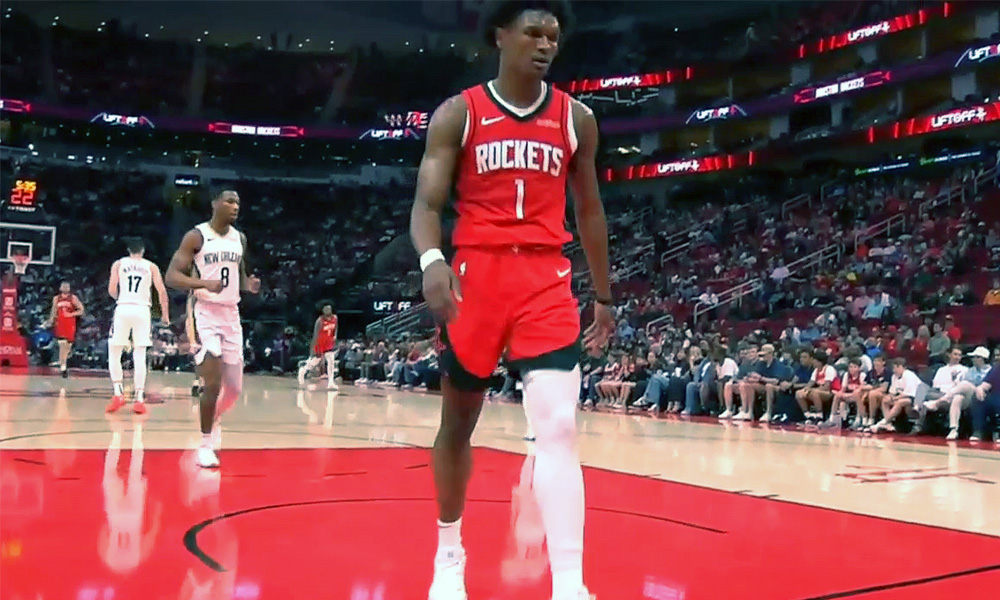
Rockets young star Amen Thompson will have his ankle injury re-evaluated in one week, according to Ime Udoka.
Thompson had an MRI on Sunday and the Rockets coach confirmed all imaging (X-ray, MRI) was negative.
“Just some swelling and pain, obviously,” said Udoka.
If you listen to Udoka, you can tell he knows how special Amen is to this team. He said the Rockets are missing a lot by not having him out there.
“Obviously, the things he does you can’t replicate,” said Udoka. “[Amen is] a guy that plays every position for us. When one goes down, he runs the point. If another is out, he runs the four.”
Amen is one of the best defensive players in the game, and as a one-on-one defender of guards/wings, he might already be the best in the league in just his second season. He’s holding his opponents to 40.5% shooting from the field, tops in the league.
“He’s a very unique defensive player,” said Udoka. “We got some guys that do some great things there, but I like to put him and Dillon on the best two usually, night to night. You got Tari and that’s a luxury as well, but the way he goes about it is different. His athleticism, size, speed, strength, shotblocking ability, steals… he’s all over the place.”
“Hard to replicate for sure.”
Amen injured his ankle late Saturday night in a blowout win against the Pelicans, but the unfortunate part was he probably should not have been on the floor in the first place.
The Rockets left Amen Thompson in the game in a blowout to get one more rebound for a triple-double and he just got injured. He's heading to the locker room with a limp. https://t.co/UBtrEpgWuU pic.twitter.com/D8GeKP8sQk
— ClutchFans (@clutchfans) March 9, 2025
The Rockets had built well over a 30-point lead by early fourth quarter. Jalen Green was able to rest the entire fourth. Alperen Sengun came out of the game with 7-8 minutes left while Dillon Brooks and Tari Eason came out with 6:00 left. But Thompson, who had posted an insane +39 on-off number, remained in the game because he was one rebound shy of a triple-double with 15 points, 11 assists and nine rebounds.
Udoka addressed that decision on Monday before the game against Orlando.
“What I typically don’t do is wholesale substitutions,” said Udoka of the decision to keep Amen in the game. “Albeit 30[-point lead] at six minutes [left] is different than losing to Minnesota, a 16-point lead with four minutes [left].”
“I’ve seen it go both ways in the past. You take out guys too early and have to bring starters back, and vice versa.”
Thompson has played in 60 games this season, five short of being eligible for postseason awards. He absolutely should be up for an All-Defensive nod this season so keep an eye on him getting back in time for that. He would need to return to action no later than April 4th for the game against the OKC Thunder in order to play enough games to be eligible.
Houston Rockets
How the Kyrie Irving Injury Impacts Rockets
Houston’s draft positioning and offseason plans could be impacted by Dallas
Published
2 months agoon
March 4, 2025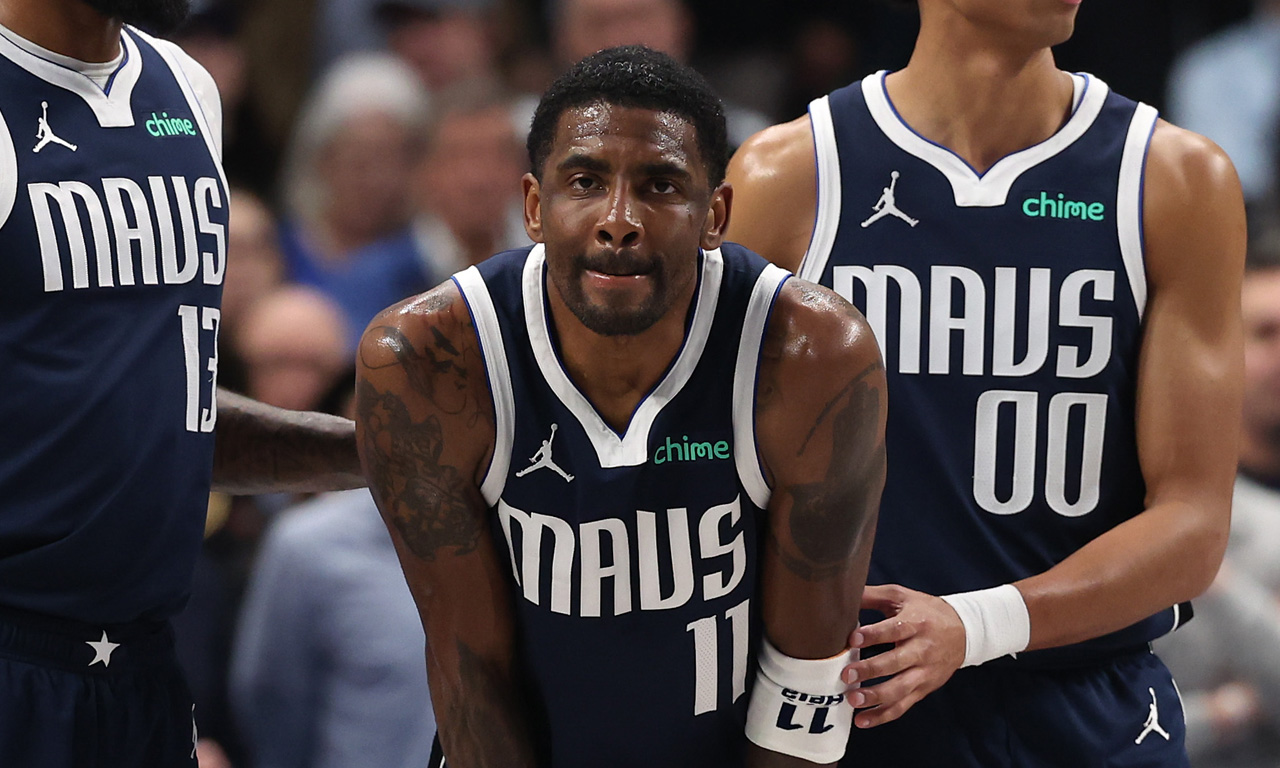
Dallas Mavericks guard Kyrie Irving was injured Monday night and the news dropped on Tuesday that the knee injury is serious — a torn ACL in his left knee that will end his season and a good portion of next season as well.
Brutal. I can’t think of an NBA team that imploded faster than the Dallas Mavericks.
You trade away a 25-year-old phenom who just hoisted you on his back en route to the NBA Finals a year ago. You cashed in that golden ticket to go all-in on a trio of aging stars in Kyrie, Anthony Davis, and Klay Thompson.
Bold strategy, Nico. Let’s see if it pays off.
(Narrator: It’s not paying off.)
The Mavericks had some interesting potential this year and maybe the next couple of years once everyone was healthy, but now? Their star guard is likely out until the calendar year 2026 and Klay and AD aren’t getting any younger nor more durable. The Mavericks may have actually swapped their future for a present that never arrives — and Dallas GM Nico Harrison has to be feeling overwhelming pressure right now.
So how does this impact the Rockets?
For starters, Houston has a game remaining on the schedule against Dallas on March 14th at Toyota Center — Davis may or may not be back for that game.
More importantly, Dallas is the 10th seed in the West at the moment, just 3.5 games ahead of the Phoenix Suns (11th seed). The Rockets control Phoenix’s first-round pick unprotected this season via a swap. We need as many West teams as possible ahead of Phoenix to keep them out of the play-in/playoffs and to push them as deep into the lotto as possible.
This complicates that. Phoenix’s remaining schedule is the toughest in the NBA by a good margin, with plenty of games left against the league’s best teams, so it still looks promising overall — but we’re talking about Kevin Durant, Devin Booker and Bradley Beal. They can still get hot at the right time while Dallas may struggle.
So keep a close eye on that. The good news is the Portland Trail Blazers are one of the hottest teams in the league and they are (shockingly) nipping at the Arizona squad’s heels.
Taking a look ahead to the offseason, the Kevin Durant Pursuit will be big.
This one is a little more complicated for Houston. The Rockets really want Devin Booker but, as of now, the Phoenix plan appears to be to trade KD this offseason and retool around Booker. The Rockets will have interest in Durant but they’re not going to sell the farm (prospects and all the picks) for a 37-year old like they would for Booker.
Three teams that I’ve heard a lot about from Rockets circles that will be in the mix are Houston, Minnesota and Dallas — Timberwolves and Mavericks have been considered the main competition. But, a lot of this will depend on Durant himself and where he wants to play at this stage of his career.
Keep in mind also, if the Suns are “retooling” around Booker and Beal (holding the no-trade clause), then they could be placing a higher priority on win-now players over the return of their own draft assets. The Rockets definitely have the best assets overall to offer up in any trade package between those three teams, but if Phoenix does prefer finding the right ready-to-win players around Booker/Beal, that gives Dallas and Minnesota a real chance.
This injury “may” take Dallas out of the equation, and they are/were definitely a contender for KD’s services given his past relationship with Kyrie and the way Dallas was positioned to win right now. Does KD at his age want to wait for Kyrie to be healthy?
And one last friendly reminder: The Rockets control that Dallas 2029 first (unprotected).
Houston Rockets
Rockets Sign David Roddy to Two-Way Contract
Former first-round pick has played with the Grizzlies, Suns and Hawks
Published
2 months agoon
March 3, 2025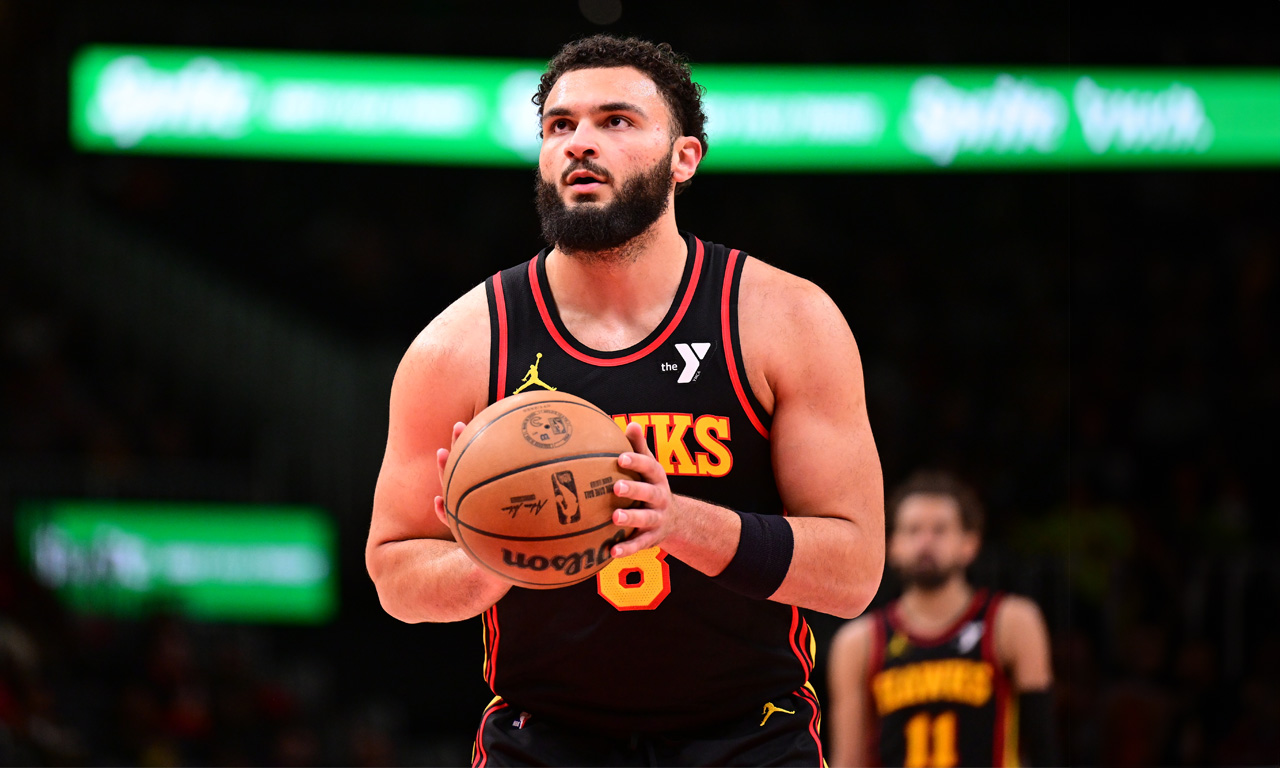
The Rockets made a move on Monday, signing former first-round pick David Roddy to a two-way contract.
The two-way spot opened up after the front office signed Jeenathan Williams to a standard four-year, $8.2 million contract (with friendly team options all along the way).
Roddy is 6-foot-5 and 250+ pounds but sports a 6-foot-11 wingspan. He was taken with the 23rd pick in the first round of the 2022 NBA Draft — six selections after the Rockets drafted Tari Eason. A standout in college, Roddy averaged 19.2 points, 7.5 rebounds, 2.9 assists, 1.2 steals, and 1.1 blocks per game during his junior season at Colorado State.
Roddy, who turns 24 later this month, is a physical player who can play multiple positions. He’s a solid rebounder for his size/position. He has played in 165 games over three seasons with the Grizzlies, Suns, Hawks and most recently Sixers, averaging 6.2 points and 2.9 rebounds per game.
The guard/forward has not shown efficient shooting, however — he’s a career 30.5% three-point shooter and just 68.4% from the line. His defense is better inside than out.
Ultimately, it will be those two things — three-point shooting and defense — that will determine his chances of carving out a consistent role in the league.
All in all, it’s a low-risk signing and the Rockets get a look at a prospect that fits their age timeline.
Houston Rockets
Houston a potential landing spot for Ben Simmons post-buyout?
Published
3 months agoon
February 6, 2025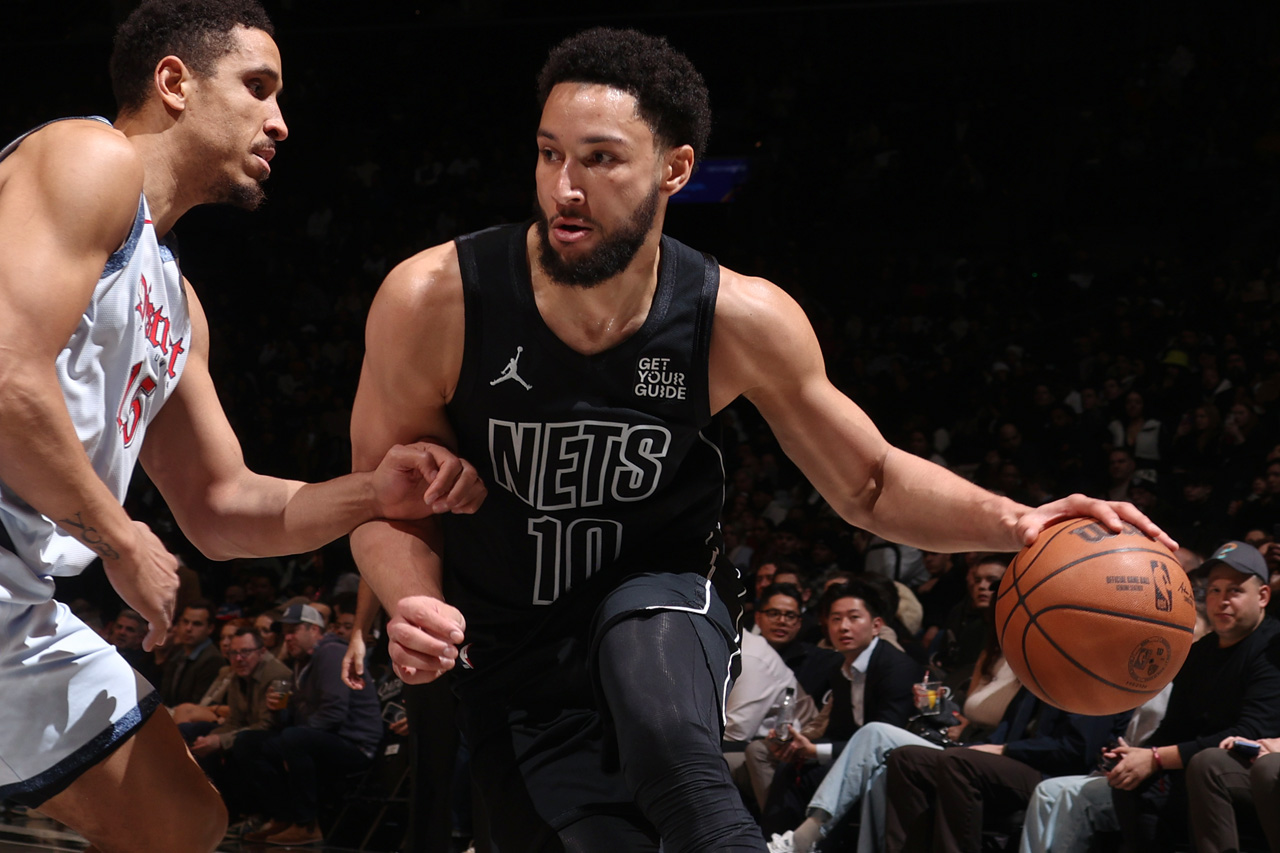
ESPN NBA analyst Brian Windhorst said on Thursday’s NBA Trade Deadline show that Brooklyn Nets forward Ben Simmons is working on a buyout and the Houston Rockets is a potential landing spot for him.
“Cleveland and Houston are two situations for Ben Simmons,” said Windhorst.
Brian Windhorst says the Cavaliers and Rockets are buyout locations for Ben Simmons.
Thoughts? pic.twitter.com/7ly4mvmxr5
— ClutchFans (@clutchfans) February 6, 2025
Advertisement
Rockets coach Ime Udoka was an assistant coach in Philadelphia in 2019-20 when Simmons was with the Sixers, before injuries took a significant toll. In fact, Udoka, when speaking about Amen Thompson earlier this season, brought up some comparisons to Simmons.
“The skill set is there, and it’s something that’s unique with his speed, athleticism, size, passing ability, and all those things,” said Udoka of Thompson. “I coached somebody, Ben Simmons, who had similar traits… as far as size and ability to push the pace, and find guys and finish. There are some similarities there.”
Both Thompson and Simmons are known for their elite athleticism, defensive versatility, and ability to create opportunities in transition.
However, can Simmons help the Rockets today? That’s the tough question.
Simmons has played in 33 games this season, averaging 6.2 points, 6.9 assists, 5.2 rebounds, 0.8 steals and 0.5 blocks in 25 minutes a night. He does not shoot threes (like, at all) — he has only attempted two threes in the past three seasons combined.
Ideally, he does not play in front of your young forwards of Amen, Tari Eason and Jabari Smith Jr. and on that basis alone, I think I would pass. But, Ime loves defensive dogs and he could use some extra ballhandling on the roster. You can see that there’s little in the way of offensive organization when Fred VanVleet is out.
There would be a comical full circle moment though if the Rockets did sign Ben Simmons, considering the Rockets were heavily criticized for trading James Harden in 2021 to Brooklyn instead of to Philadelphia for Simmons. The Rockets clearly made the right choice there.

